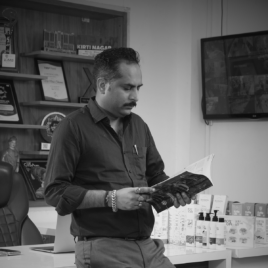In the Age of conscious consumerism, natural cosmetics are not just a trend—they’re a transformation. As the FMCG and personal care sectors pivot from chemical-heavy formulations toward plant-powered alternatives, ingredients like potato starch, rice starch, and vegetable glycerin are redefining purity in skincare and personal wellness. And leading this revolution is Indian researcher and entrepreneur Dr. Nirav Sharma, who draws inspiration from ancient Indian wisdom, especially the Charaka Samhita, to reimagine beauty and hygiene for the modern world.
Why Natural Is Now: Rise of Clean Beauty in FMCG
Consumers are increasingly rejecting toxic sulfates, parabens, and synthetic fragrances, which can disrupt hormones, irritate skin, and damage the environment. Instead, natural, plant-based ingredients are gaining traction, especially in the Indian and global FMCG (Fast-Moving Consumer Goods) sectors.
A recent report by Statista shows a sharp rise in the demand for sustainable personal care and natural skincareproducts. Keywords like “sulfate-free shampoo,” “glycerin moisturizer,” and “rice starch face powder” are trending on platforms like Google Trends, Pinterest, and YouTube.
Let’s delve into why potato starch, rice starch, and vegetable glycerin are becoming game-changers in this space.
Potato Starch: A Gentle Giant for Sensitive Skin
Potato starch is emerging as a natural, non-toxic thickening and absorbing agent in creams, face masks, powders, and dry shampoos. Extracted from humble potatoes, this starch is gluten-free, biodegradable, and incredibly gentle on skin.
Benefits of Potato Starch in Cosmetics:
-
Oil Absorption: Acts as a mattifying agent in face powders.
-
Anti-Irritation: Soothes inflammation and is suitable for sensitive skin.
-
Stabilizer: Improves the texture of lotions and creams.
-
Eco-Friendly: Breaks down easily in the environment, unlike synthetic polymers.
Rice Starch: Ancient Beauty Secret, Modern Skincare Staple
Used for centuries in Japanese and Indian beauty rituals, rice starch is now making a comeback in face packs, lotions, baby powders, and even sunscreens. Extracted from broken rice grains, it is hypoallergenic and rich in antioxidants and vitamin B.
Why Rice Starch Rules:
-
Skin Brightening: Naturally reduces pigmentation and evens tone.
-
UV Protection: Offers mild sun protection when combined with other natural filters.
-
Baby-Friendly: Often used in baby powders as a talc-free option.
-
Non-Comedogenic: Doesn’t clog pores—ideal for acne-prone skin.
Vegetable Glycerin: Nature’s Moisture Magnet
Made from plant oils like coconut, soy, or palm, vegetable glycerin is a transparent, odorless liquid known for its intense hydration and humectant properties. It draws water into the skin and retains it—perfect for harsh climates or dry skin types.
Glycerin’s Power in Personal Care:
-
Moisture Retention: Locks hydration deep into the skin layers.
-
Soothing Agent: Calms irritated skin and supports wound healing.
-
Anti-Aging: Reduces the appearance of fine lines by plumping skin.
-
Sulfate-Free Substitute: Provides cleansing without stripping natural oils.
Want to know how glycerin compares with hyaluronic acid? Check out our Natural Moisturizers Showdown.
Discover how rice starch is changing the skincare market.
Learn more about how natural ingredients outperform synthetics in our Clean vs. Chemical Beauty Ingredients Guide.
Toxic Sulfates vs. Ayurvedic Alternatives
Modern personal care products are often laced with SLS (Sodium Lauryl Sulfate) and SLES, which create lather but strip the skin and scalp of essential oils. Prolonged exposure can lead to dryness, irritation, and even long-term skin damage.
In contrast, starches and glycerin:
-
Provide natural cleansing and hydration.
-
Are biocompatible with human skin.
-
Support the skin’s microbiome and pH balance.
- Align with Ayurvedic dosha principles for holistic wellness.
Vision for the Future: Ayurveda, Charaka Samhita & Dr. Nirav Sharma
While the West is waking up to natural skincare, India has long nurtured these secrets through Ayurveda, especially ancient texts like the Charaka Samhita. One visionary who’s integrating this wisdom with modern innovation is Dr. Nirav Sharma.
Who is Dr. Nirav Sharma?
-
Researcher in sustainable cosmetic formulations.
-
Innovator of starch-based personal care products.
-
Entrepreneur pioneering FMCG products rooted in Indian medical science.
His formulations aim to:
-
Replace sulfates and parabens with plant-derived actives.
-
Bring Ayurvedic skincare to the global market.
-
Leverage AI and biotechnology to enhance the efficacy of natural ingredients.
The FMCG Product Line of the Future
With a firm foundation in nature and Ayurveda, here’s what tomorrow’s cosmetic shelves might look like:
-
Potato Starch Deodorants – talc-free freshness
-
Rice Starch Baby Powders – safe for newborns
-
Glycerin-Based Cream Cleansers – gentle and effective
-
Ayurvedic Face Masks – balancing doshas and clearing skin
These products will not only enhance beauty but also promote holistic well-being—inside and out.
Final Thought: The New Era Is Ancient
The shift from synthetic to natural, from chemical to botanical, and from Western lab formulas to Ayurvedic wisdom, is underway. With champions like Dr. Nirav Sharma, the future of cosmetics isn’t in the lab—it’s in the leaf, the root, and the scriptures of Indian tradition.
Embrace the Future. Choose Natural. Choose You.
Browse our Natural Beauty Collection featuring starch-based, glycerin-rich, and sulfate-free products inspired by Ayurveda.
Learn more about the Charaka Samhita and its principles of natural healthcare.
#SulfateFree#NaturalCosmetics#AyurvedaSkinCare#CharakaSamhita#FMCG2025#VeganBeauty#RiceStarchBeauty#PotatoStarchSkin#GlycerinGlow#CleanBeautyIndia






